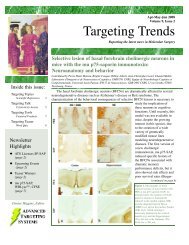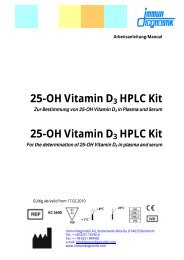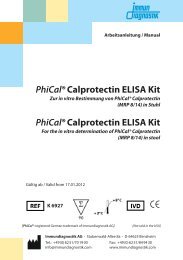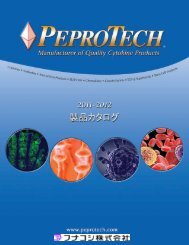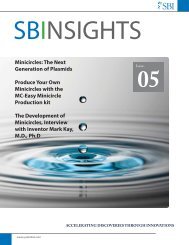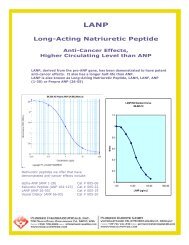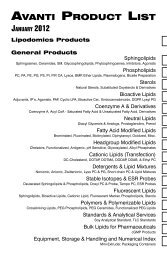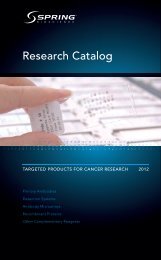T7 RNA Polymerase Expression System for Bacillus megaterium
T7 RNA Polymerase Expression System for Bacillus megaterium
T7 RNA Polymerase Expression System for Bacillus megaterium
You also want an ePaper? Increase the reach of your titles
YUMPU automatically turns print PDFs into web optimized ePapers that Google loves.
© MoBiTec GmbH, 2012 Page 7<br />
4. Protocols<br />
4.1. Cloning the DNA fragment of interest<br />
The pP<strong>T7</strong> E. coli / B. <strong>megaterium</strong> shuttle vector is supplied as lyophilized DNA. Follow<br />
standard protocols <strong>for</strong> propagation of the plasmid in E. coli, plasmid mini preparation,<br />
restriction endonuclease cleavages and ligation of the DNA fragment of interest into the<br />
vector (Sambrook and Russell, 2001). After ligation of the insert, the vectors should be<br />
propagated in E. coli (amp r ) be<strong>for</strong>e trans<strong>for</strong>ming the <strong>Bacillus</strong> protoplasts (tet r , cm r ).<br />
4.2. General remarks on the handling of B. <strong>megaterium</strong><br />
Strains will grow well on rich media such as LB medium, plates and liquid, at 30 °C and<br />
37 °C. Make sure to aerate liquid cultures well by vigorous agitation in baffled shaking<br />
flasks.<br />
We found MS941 and derived strains to be asporogenic on common medium - they will<br />
die on plates, kept at 4 °C, within two weeks, so prepare glycerol stocks (30 % w/v) as a<br />
backup and streak the working cultures on fresh plates every 7 - 10 days.<br />
Positive clones carrying the plasmids of interest can be selected by adding 10 µg/ml<br />
tetracycline and 4.5 µg/ml chloramphenicol to the growth medium.<br />
To prove successful overexpression of the target gene harvest small samples of the<br />
culture just be<strong>for</strong>e and at intervals after induction of recombinant gene expression with<br />
xylose. To obtain crude extracts <strong>for</strong> gel analysis, the bacilli have to be lysed using<br />
lysozyme. Simple boiling of cells in sample buffer (Laemmli, 1970), which is quite<br />
convenient <strong>for</strong> E. coli, does not work with B. <strong>megaterium</strong>.<br />
4.3. Trans<strong>for</strong>mation of B. <strong>megaterium</strong> protoplasts<br />
For recombinant protein production B. <strong>megaterium</strong> protoplasts pretrans<strong>for</strong>med with p<strong>T7</strong>-<br />
<strong>RNA</strong>P are trans<strong>for</strong>med with the plasmids (pP<strong>T7</strong>-derivatives) coding <strong>for</strong> the protein of<br />
interest. After trans<strong>for</strong>mation it is advisable to screen at least three different clones <strong>for</strong><br />
protein production as the yield can vary among different clones.<br />
Since B. <strong>megaterium</strong> cannot easily be trans<strong>for</strong>med naturally, MoBiTec conveniently<br />
provides protoplasts of B. <strong>megaterium</strong>, which are ready <strong>for</strong> trans<strong>for</strong>mation. MoBiTec<br />
produces these protoplasts every second month. They can be used at least 2 months<br />
after date of arrival and have to be stored at -80 °C. The protoplast suspension is<br />
supplied in 5 aliquots of 0.5 ml each to prevent multiple freezing and thawing of<br />
protoplasts that are not used immediately. One aliquot is provided per trans<strong>for</strong>mation. It<br />
is advisable to use two of the vials <strong>for</strong> the control experiments as described below.<br />
Below you can find a standard protocol <strong>for</strong> trans<strong>for</strong>mation of protoplasts.<br />
MoBiTec GmbH, Germany � Phone: +49 551 70722 0 � Fax: +49 551 70722 22 � E-Mail: info@mobitec.com � www.mobitec.com



